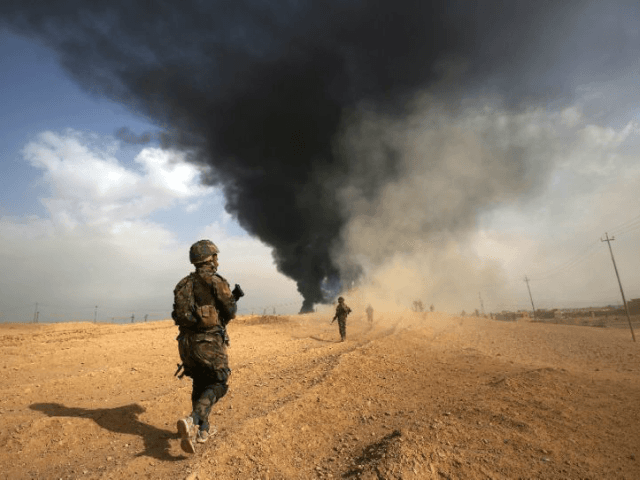The end of the so-called Islamic State (ISIS/ISIL) caliphate that once expanded across vast swathes of two countries is within reach now that the jihadists lost the last-remaining city under their control in Syria and its final stronghold in Iraq along the border.
“Frankly the tempo of our operations is going to reduce as Daesh [ISIS] are beaten in Iraq and in Syria,” conceded Air Commander Johnny Stringer in charge of Britain’s contribution to U.S.-led air coalition against the Islamic State, reports the Telegraph.
ISIS’s so-called caliphate had “all but disappeared,” declared the commander.
However, he indicated that “it was now likely to morph into an insurgent organization.”
On Friday, Iraqi military forces, backed by U.S.-led coalition air power and Iran-allied Shiite militias, led the offensive to defeat ISIS in al-Qaim, described by the Daily Mail as the last bastion in Iraq near its border with Syria.
Meanwhile, forces loyal to Syrian dictator Bashar al-Assad, assisted by Iran-backed Shiite militias and Russian air support, pushed ISIS out of Deir Ezzor on the Syrian side of the international boundary.
ISIS’s so-called “caliphate” was depleted to ruins after the jihadist group was forced out of its remaining strongholds in Iraq and Syria—most recently al-Qaim and Deir Ezzor, respectively, notes Daily Mail.
Echoing other analysts, Maha Hosain Aziz, an expert from New York University, cautioned that as it feels its defeat closing in, ISIS will change tactics and may even try to join forces with other jihadists, including its alleged enemy al-Qaeda.
“Look for more coordination between ISIL and al-Qaeda outside, and inside Syria and Iraq, despite their ongoing friction in other areas such as Yemen,” Aziz told the Telegraph, adding, “ISIS will also continue to expand its recruitment pool worldwide to prepare for its long-term goal of forming a global Islamic caliphate.”
Experts like Katherine Zimmerman from the American Enterprise Institute (AEI) believe the Syrian al-Qaeda wing has capitalized on ISIS losses in the Middle East, establishing itself as the “strongest” branch of the jihadist group in the world and setting up the conditions in Syria to erect its own Islamic emirate.
Although many experts and military leaders believe ISIS’s defeat is imminent, they warn that its ideology will outlive its military defeat.
The recently liberated regions had been “strategically important as a corridor to transfer fighters, arms and goods between Iraq and Syria” acknowledge the Telegraph.
Pushing ISIS out of that border region has opened a route that will also allow Iran-backed Shiite militias in Iraq to link up with their counterparts in Syria, something that may stir the pot among those who do not trust the Shiite Islamic Republic.
The Islamic Republic is now closer to establishing a corridor from its border, through Iraq and all the way to the Mediterranean that will provide it unhindered land access to its allies in Syria and Lebanon for the first time.
ISIS’s “caliphate,” which once expanded across swathes of Iraq and Syria, is crumbling as a result of the nearly three-year international offensive.
The United Kingdom is now considering withdrawing its warplanes from the U.S.-led coalition effort against ISIS, a move that will likely prompt other partners to follow suit.
Seizing Deir Ezzor also dealt a financial blow to the jihadists, ending their ability to generate millions from the sale of oil there.
According to U.S.-led coalition figures provided to USA Today, the international alliance had slashed ISIS oil revenues by more than 90 percent as of the beginning of October, reducing their earnings to less than $4 million per month from a peak of $50 million.
The coalition has continued to slash the funding sources that ISIS uses to pay for its terrorist activities.
Moreover, the U.S. State Department revealed to reporters in August that territorial losses suffered by ISIS have “dramatically accelerated” under U.S. President Donald Trump from the 35,000 square miles the jihadist group is believed to have controlled at its peak in Iraq and Syria in early 2015 to only 8,000, marking an 80 percent loss.
With the recent victories, ISIS has lost about 90 percent of its “caliphate,” reveals the Telegraph.
“Most of the area it [ISIS] now controls is sparse desert which runs from Sukhna in Syria to a few miles west of Baiji in Iraq,” notes the Telegraph. “The territory is largely uninhabited except for the cities of Mayadin and Al-Bukamal which sit along the Euphrates river, and several smaller surrounding towns.”

COMMENTS
Please let us know if you're having issues with commenting.